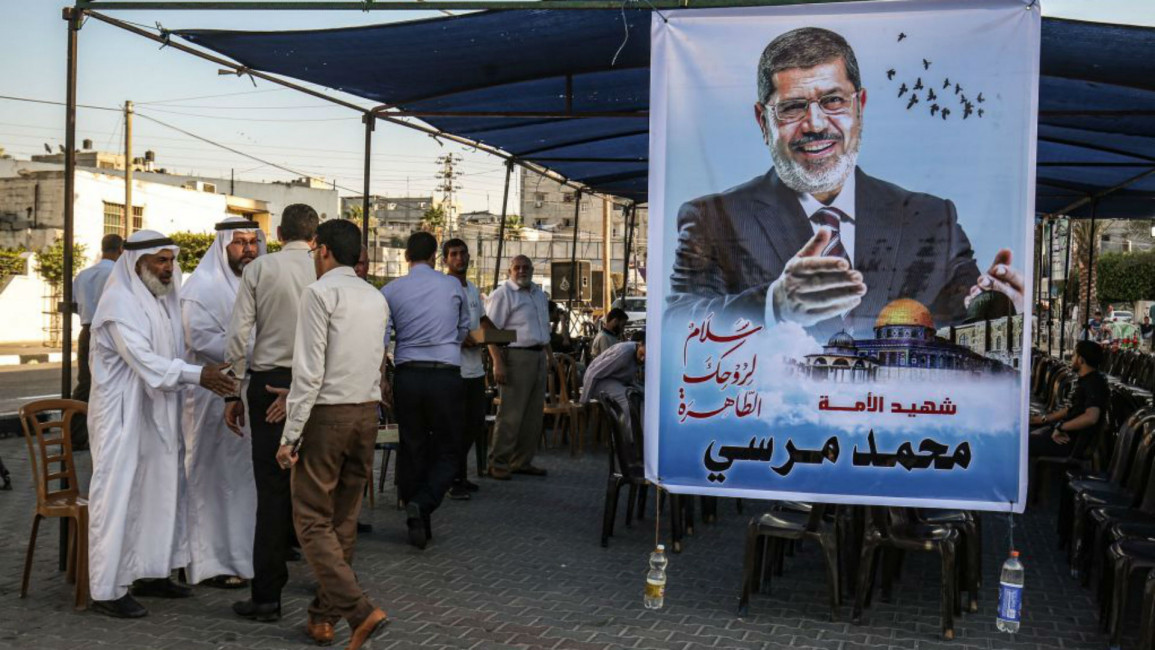
Only Morsi was capable of bringing peace to Gaza
This Monday, the only democratically elected president in Egypt's history, Dr. Mohammed Morsi, passed away shortly after a court appearance, and after six years of political arbitrary detention, isolation, abuse and inhumane neglect.
Morsi's family - who were allowed to see him only a couple of times - has complained repeatedly that the deliberate negligence of the state in addressing his seriously deteriorating health would eventually kill him, but the state conveniently dismissed their protestations.
While the Morsi administration and policies might have been the subject of lively debate, it is however, indisputable that Egypt has become a darker place since the military coup that ousted him in 2013. And as Egypt goes, so goes the Middle East; most specifically, the country's north-eastern neighbour; Gaza.
And if there’s a crucial lesson Palestinians will take from Morsi's legacy, it's that he alone was successful in helping bring peace to Gaza.
The single year in which Morsi was Egypt's president remains perhaps the best that Gaza ever experienced since the Israeli blockade in 2007.
His short time in power will be remembered with great fondness in the Gaza Strip; a place on earth where tomorrow is certainly worse than the day before, thanks to the continued, and unjustified Israeli siege.
Under Morsi, the besieged enclave began to regain some of its prosperity and security. The isolation of Gaza was broken when the blockade was only partly challenged on Egypt's side, and there are ample lessons to learn from this.
Opening Gaza's borders with Egypt no doubt took a great deal of moral courage and political will, but reviving Gaza depends on opening its gates to the world. The freer flow of goods and people in both directions played a crucial role in the improvement of life in the Strip, as Gaza was finally reconnected with a world beyond the giant concrete walls that strangle it and render it unlivable.
 |
Gaza's social fabric proved remarkably able to heal when given half a chance |  |
And how did that impact Israel?
Unlike the mainstream myth that a free Gaza poses serious danger to Israel's security, Morsi's policies towards Gaza brought "an unprecedented period of calm in southern Israel," according to senior Israeli analyst, Anshel Pfeffer.
When Morsi gave Gaza a moment of respite, Palestinians of course opted to improve the Gaza Strip, instead of violently kicking and screaming, or desperately deserting their homeland to seek shelter from the continued Israeli assault on a caged and defenseless population.
Twitter Post
|
The virtually unrestricted access to Gaza that Morsi provided helped to lift it up from the abyss - albeit temporarily - where the stability and security such access created and encouraged foreign and local investments.
Agricultural production, cattle and fish farming and micro-financing of entrepreneurial initiatives were all on the rise.People who escaped the conflict were returning home to reinvest the savings they accumulated abroad, and were more trusting of launching significant initiatives without fear that their efforts would be liable for destruction in the next Israeli assault.
Visitors to the enclave saw luxurious four- and five-star hotels, a choice of restaurants, shopping malls, museums and resorts germinate around the Gaza Strip. Despite prolonged torment and abuse, Gaza's social fabric proved remarkably able to heal when given half a chance.
This short moment of respite also facilitated the restoration of social bonds for families who had been cut off from each other by Israel's occupation or blockade, and were finally able to meet for the first time in decades.
I, myself was finally able to see my returning aunts and uncles, previously separated from me by the walls of Gaza that stood coldly between us.
Gaza's youth began to see renewed hope on the horizon. Social movements, environmental campaigns and other admirable initiatives went viral; from recycling, to street cleaning to painting houses in refugee camps in cheerful colours. Everyone was busy trying to make Gaza more beautiful.
Furthermore, the short-lived opening of Gaza under Morsi pushed everyone towards moderation, including Hamas. Its leaders were able to travel abroad and interact with the international community, which broadened their understanding of a world that they previously were never allowed to see.
Tunnel building on Gaza's borders was suspended as there was no more need to smuggle consumer goods as they were finally flowing legally through Egyptian borders.
 |
Nonetheless, Morsi's era remains the most effective framework for improving life in Gaza |  |
Unlike the current international community, Morsi didn't pressure the weak, powerless and oppressed Palestinians to succumb to Israel's demands, but rather aimed to bridge the gap between the two sides, and produce something concrete and meaningful that would improve the lives of Palestinians.
Such an environment was largely conducive to change, for Hamas trusted that it could negotiate with Israel in good faith through an unbiased mediator.
Egyptian intelligence held regular meetings with Hamas leaders to advance a breakthrough in the Israeli-Hamas conflict, and even managed to sway Hamas' top military leader Ahmed Jabari to retire from military activities and join the political establishment.
Read more: Arab accountability begins here: Riyadh and Cairo in the dock over Khashoggi and Morsi
Trusting that Egypt's Morsi would enforce any agreed-upon understandings between Hamas and Israel, Jabari was advancing a permanent ceasefire proposal with Israel through which Gaza was to solely aim to become a thriving society.
Jabari even founded a special armed unit called the "field control" that's dedicated to preventing any armed groups in Gaza from unilaterally launching primitive projectiles on Israel. By the time that Israel assassinated Jabari in November 2012, he was described by Haaretz editor, Aluf Benn, as a "subcontractor, in charge of maintaining Israel's security in Gaza". Both sides appeared to see a way forward.
In July 2013, Sisi's ascendance to power with a military coup brought this entire dream to an end.
Sisi instantly closed Gaza's borders to appease Israel's far-right government, and life began to fade once more. Everything that Gazans had built in that one year was either destroyed in the 2014 Israeli war on Gaza, or is presently gathering dust. The devastated local economy makes it unaffordable for people to enjoy the basics of a decent life.
 |
Reviving Gaza depends on opening its gates to the world |  |
The consequences of Morsi's dramatic death on Monday are yet to be seen. But it’s clear that Egypt's current president, Abdel Fattah al-Sisi - a man unanimously deemed one of the most paranoid in the region - will hasten to preemptively crush any potential unrest in Egypt.
This essentially means that Gaza will share the heavy price of the inevitable counterinsurgency campaign.
Nonetheless, Morsi's era remains the most effective framework for improving life in Gaza.
His brief presidency provided a glimpse of how lifting the blockade could create genuine and sustainable peace on the ground, something that today, remains a distant memory.
Muhammad Shehada is a writer and civil society activist from the Gaza Strip and a student of Development Studies at Lund University, Sweden. He was the PR officer for the Gaza office of the Euro-Med Monitor for Human Rights.
Follow him on Twitter: @muhammadshehad2
Opinions expressed in this article remain those of the author and do not necessarily represent those of The New Arab.




